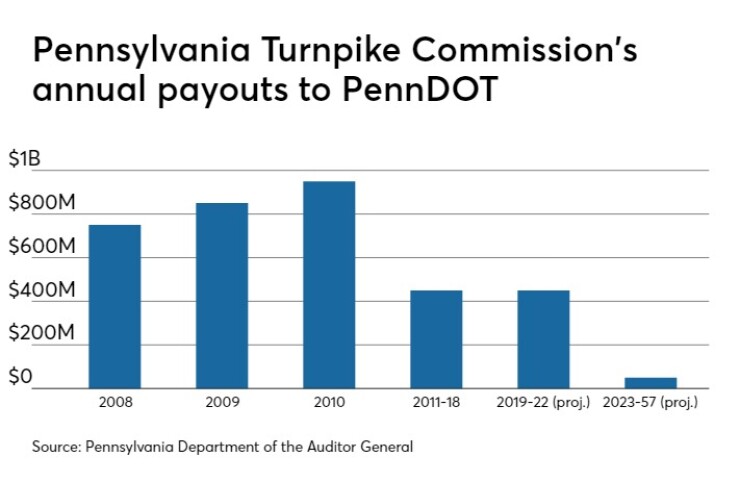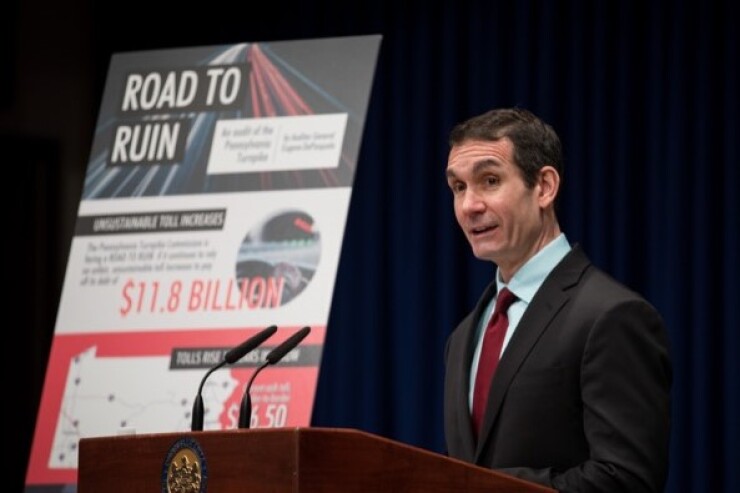The Pennsylvania Turnpike Commission is weighing a return to bonding for mass-transit projects.
It suspended that borrowing after a trucking organization sued it in March 2018 over the constitutionality of its tolling system, but a federal judge dismissed the suit last month. The truckers intend to appeal.

This comes as the Turnpike is staring at $11.8 billion of debt, largely due to massive annual payments to the state Department of Transportation under an ill-advised agreement in 2007 that wrongly assumed federal approval of tolling on east-west Interstate 80 in Pennsylvania.
State Auditor General Eugene DePasquale said the debt level threatens the Turnpike's existence. Next year the debt could exceed that of the commonwealth.
DePasquale, in his latest
“The General Assembly’s attempt at enacting a quick fix has pushed us down a slippery slope of unintended consequences,” DePasquale said. “The Turnpike Commission, once viewed by some as a cash cow, has been milked to the brink of collapse.”
Short term, the Turnpike got a reprieve from the U.S. District Court for the Middle District of Pennsylvania in Harrisburg.
Judge Yvette Kane, in a
Grain Valley, Missouri-based OOIDA also challenged the legality of directing some toll revenue for mass transit projects, claiming that the Turnpike is violating the Commerce Clause of the U.S. Constitution by raising tolls to fund non-highway transportation projects in the state.
The truckers say they will appeal to the Third Circuit Court of Appeals.
“This lawsuit is far from over,” OOIDA president Todd Spencer said. “And win or lose on appeal, the Turnpike’s debt crisis and the commonwealth’s transportation emergency aren’t going away, either. This is a crisis created by the legislature’s decisions, not our lawsuit.”
More than half of Pennsylvania Turnpike's annual revenue of $1.2 billion goes to debt payments. More than half its debt traces to the $6 billion-plus it has sent to PennDOT under the 2007 law, designed to pump more money into Pennsylvania’s highways and public transit systems.
Moody’s Investors Service called Kane's ruling an initial step toward clarity on the funding law, while saying it’s no long-term fix for the Turnpike. Moody’s rates the Turnpike’s senior bonds A1 and its subordinate bonds A3.
Fitch Ratings and Kroll Bond Rating Agency said they would monitor both the Turnpike's reaction and any appeal.
“I think the bond markets have gotten over the kinds of concerns about funding and subordinate debt that evolved from the truckers’ lawsuit,” said Alan Schankel, a managing director at Janney Capital Markets in Philadelphia.
While the Turnpike has a variety of borrowing structures, roughly 84% of its debt consists of senior and subordinate revenue bonds, according to Janney.

Pennsylvania Turnpike subordinates were trading about 85 basis points over the benchmark before the lawsuit, a spread that widened by about 25 basis points after the truckers filed the complaint. Early this week they were back to about 85 bps.
The commission is one of the longest standing muni issuers in Pennsylvania, predating the Turnpike’s opening in 1940. Its system links New Jersey with Ohio.
In 2007, under Gov. Ed Rendell, the Pennsylvania legislature
The Federal Highway Administration rejected the tolling proposal, but the turnpike commission still had to make annual payments of $450 million to PennDOT through 2057, with $200 million supporting road and bridge projects in the state and $250 million for transit projects, notably in Philadelphia and Pittsburgh. Rendell is a former Philadelphia mayor.
"The I-80 fiasco for making this a toll road should not even be an option for future state budgets,” said Villanova School of Business professor David Fiorenza. “Bringing this to the budget tables since the Rendell administration shows the various governors’ administrations will see what revenues stick like glue from year to year."
Act 89, passed in 2013, revised the funding obligation and required PTC to pay PennDOT $450 million annually through fiscal 2022, with $430 million targeted for mass transit projects and the balance for rail freight, ports, bicycles and pedestrians.
After 2022, the obligation falls to $50 million annually through 2057. Through the legislation, subordinated debt funds these payments.
The Act 44 missteps “did a fair amount of damage independent of the truckers’ lawsuit,” said Schankel.
DePasaquale expects toll rates to triple within 30 years, which may lead more drivers to avoid the highway and use winding and steep alternate routes. He said stagnant traffic growth and a reduction in projected traffic may indicate this is already occurring.
The current cash toll for a car, border to border, is $56.50.
“The legislature has turned their focus to more gambling, betting and legalization of marijuana,” said Fiorenza, a former chief financial officer of Radnor County in suburban Philadelphia.
DePasquale, in fact, proposes regulating and taxing marijuana based on Colorado’s model. “We’re two and a half times their size,” he said.
According to DePasquale, pot could bring in roughly $600 million, “which means you can replace the entire public transit number and add $150 million into your basic education funding formula without any other type of tax increase.”
A mad scramble has ensued nationally over how to allocate marijuana revenue, with 33 states having legalized pot and 10 of them also having approved recreational use.
Transit, pension liability, housing and budget gaps are all possible targets. In New York, Mitchell Moss, director of New York University’s Rudin Center for Transportation, has called for a cannabis tax to help fund the region’s strained mass transit system.
Other approaches are on the table for the Pennsylvania Turnpike, according to Fiorenza.
“This Turnpike Commission could really use
Pennsylvania’s two’s largest cities, which bookend the state, want new transit projects to accommodate growth.
“Philadelphia and Pittsburgh are essential for the continued funding and lobbying of transit projects locally and to expand regionally as both metropolitan areas continue to spread past their respective City Hall locations,” Fiorenza said.
The lawsuit also marks the latest toll-related pushback by trucking groups as many states consider implementing or expanding tolling to bolster revenue.
Three truckers and the American Trucking Association sued
In





